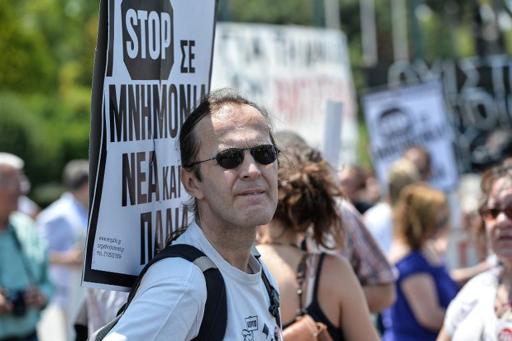Greece on Wednesday geared up for a parliamentary vote on tough reforms demanded by eurozone creditors in exchange for a huge new bailout, just hours after a bombshell IMF report criticised the deal.
The outcome was unclear after the International Monetary Fund issued a stark warning that Greece's creditors will have to go "far beyond" existing estimates for debt relief to stabilise the country's finances.
The last-ditch deal struck Monday to prevent the country crashing out of the euro saw Prime Minister Alexis Tsipras agree to sweeping reforms. They include changing labour laws, pensions, VAT and other taxes -- all conditions that had been rejected by voters in a July 5 referendum.
The parliament in Athens must approve the deal before the 18 other eurozone leaders start negotiations over what Greece is to get in return: a three-year bailout worth up to 86 billion euros ($95 billion), its third rescue programme in five years.
Under the plan, eurozone governments will contribute between 40 and 50 billion euros, the IMF will contribute another chunk and the rest will come from selling off state assets and from financial markets, a European official said.
Tsipras has admitted he "cannot say with certainty" that it will be enough to prevent a so-called "Grexit" until the final bailout agreement is signed.
Economically viable?
An IMF official said the fund would only participate in a third bailout if EU creditors produce a clear plan. The current deal "is by no means a comprehensive, detailed agreement," the official said.
It was not the first time the IMF has urged greater debt relief. But political analysts questioned why the strongly-worded report appeared not to have been taken into account in the agreement.
The revelations put greater strain on Tsipras, who has been forced to turn to pro-European opposition parties to get the reform measures through parliament after a rebellion by some 30 rebel lawmakers in his own radical left Syriza party.
The embattled premier said he took "full responsibility" for signing an accord he did "not believe in." He said he agreed to it "to avoid disaster" as the country teetered on the brink of economic collapse.
"A prime minister must fight, speak the truth, take decisions and not run away," Tsipras said in an interview on Greek public television, when asked whether he would resign if the reforms fail to pass or he loses his parliamentary majority.
Finance Minister Euclid Tsakalotos told a parliamentary debate: "It's a difficult deal, for which only time will show if it is economically viable."
Parliamentary speaker Zoe Konstantopoulou urged defiance against the creditors, saying MPs "have the right" to base their vote on the IMF report.
And Syriza's hardline leftists, lead by Energy Minister Panagiotis Lafazanis, were reported by Greek media as braced to vote against the measures while calling for a return to the drachma.
Polls published late Tuesday by Kapa Research found 72 percent of Greeks surveyed thought the deal was necessary if tough, but many nevertheless saw it as a humiliating climbdown for a country still reeling from years of painful austerity.
Small anti-austerity protests were held in Athens and Thessaloniki, with police in riot gear closing off roads around parliament ahead of a large-scale demonstration expected late Wednesday. A strike by civil servants against the deal was disrupting travel.
Despite the turmoil, 68 percent of people said that if the political fallout from the vote should result in a new coalition, it should be led by Tsipras.
More payments due
Under the deal, Greek assets for privatisation will be parked in a special fund worth up to 50 billion euros, with some 25 billion euros of the money earmarked to recapitalise Greece's banks.
Tsipras said Greeks' savings were safe, but the reopening of the banks -- which have been closed since the end of last month -- depended on the finalising of the deal, which could take a month. The finance ministry said they would remain closed until at least Thursday.
The European Central Bank has been keeping Greek banks afloat with emergency liquidity, but it could be forced to cut off that aid if Greece misses a huge debt repayment due on Monday.
European governments are meanwhile divided over options to help Greece meet its short-term cash needs while it waits for the eurozone bailout deal to be finalised, which will likely to take at least four weeks.
The European Commission on Wednesday formally backed a controversial proposal to use an EU-wide crisis fund to cover Greece's short-term cash needs, officials said, setting up a clash with Britain and Germany.
In a sign of the ongoing concern about the global fallout of the Greek crisis, US Treasury Secretary Jacob Lew will travel to Germany and France on Wednesday and Thursday for talks with top officials.
If Greece does pass the agreement, Europe's next step would be to push the deal through several national parliaments, many in countries that are loath to afford Athens more help.





















































